Why Teachers Should Not Give Homework: A Closer Look

- Post author By admin
- March 25, 2024
Homework. The word itself might bring a shiver down the spine of many students, but it’s time we took a closer look at whether it’s really serving its purpose. In this blog, we’ll explore why teachers should not give homework and delve into its potential impacts on students and families.
Table of Contents

Why is homework not effective?
Homework’s effectiveness is a subject of ongoing debate among educators and researchers. Several reasons contribute to the perception that homework may not always be effective:
Lack of Individualization
Homework assignments often fail to account for students’ diverse learning styles, interests, and abilities. What works for one student may not work for another, leading to limited effectiveness in promoting understanding and retention of material.
Limited Feedback
Homework typically lacks immediate feedback, which is crucial for students to identify and correct misconceptions. Without timely guidance, students may reinforce incorrect understanding or miss opportunities for deeper learning.
Inequity in Access
Not all students have equal access to resources needed to complete homework assignments, such as textbooks, technology, or a quiet study space. This can exacerbate existing inequalities in educational outcomes.
Time Constraints
Students have various responsibilities outside of school, including extracurricular activities, family obligations, and part-time jobs. Excessive homework can encroach upon students’ time for rest, relaxation, and other important activities, leading to stress and burnout.
Rote Learning vs. Understanding
Homework assignments sometimes prioritize rote memorization over genuine understanding. This can lead to surface-level learning rather than fostering critical thinking, problem-solving, and creativity.
Diminished Intrinsic Motivation
Homework can sometimes become a chore rather than a meaningful learning experience. When assignments feel tedious or irrelevant, students may lose intrinsic motivation for learning, leading to disengagement and decreased academic performance.
Quality vs. Quantity
The effectiveness of homework depends on the quality of assignments rather than the quantity. Meaningful, purposeful tasks that reinforce classroom learning and encourage independent inquiry are more likely to yield positive outcomes than busywork or repetitive exercises.
Overall, while homework can have benefits when designed and implemented thoughtfully, its effectiveness hinges on various factors, including alignment with learning goals, consideration of students’ needs and circumstances, and opportunities for meaningful feedback and reflection.
Why Teachers Should Not Give Homework
Teachers should reconsider giving homework for several compelling reasons:
- Mental Health Impact: Homework can contribute to stress, anxiety, and even depression in students. Excessive workload and pressure to complete assignments within tight deadlines can take a toll on students’ mental well-being.
- Family Time: Homework often cuts into valuable family time, reducing opportunities for bonding, relaxation, and pursuing extracurricular activities. This can strain parent-child relationships and disrupt the balance between academic and personal life.
- Inequities in Access: Not all students have equal access to resources needed to complete homework, such as textbooks, technology, or a quiet study space. Assignments that require internet access or specialized materials can exacerbate inequalities among students.
- Limited Learning Efficacy: Research suggests that the correlation between homework and academic achievement is not always strong. Homework may promote rote memorization rather than deep understanding and critical thinking skills. In some cases, it may even hinder learning by overwhelming students or reinforcing misconceptions.
- Loss of Creativity and Play: Homework can encroach upon time that could be spent engaging in creative pursuits, hobbies, or unstructured play. These activities are essential for fostering imagination, problem-solving skills, and emotional well-being.
- Strain on Teachers: Designing, assigning, and grading homework can be time-consuming for teachers, diverting attention from other instructional activities and professional responsibilities. It can also lead to burnout and dissatisfaction among educators.
Alternative Activities That Teachers Can Assign To Students
Teachers have a plethora of alternative activities they can assign to students that promote learning, engagement, and creativity. Here are some examples:
- Independent Reading: Encourage students to select books of their choice and spend time reading for pleasure. This promotes literacy skills, expands vocabulary, and fosters a love of reading.
- Journaling: Assign reflective journal entries where students can write about their thoughts, experiences, or reactions to prompts related to the curriculum or personal interests. Journaling enhances writing skills, critical thinking, and self-awareness.
- Research Projects: Task students with researching a topic of interest or relevance to the curriculum and presenting their findings in a written report, multimedia presentation, or oral presentation. This encourages independent inquiry, information literacy, and communication skills.
- Creative Writing: Prompt students to write stories, poems, or scripts that allow them to express their imagination and creativity. Creative writing assignments develop storytelling abilities, language proficiency, and originality.
- Virtual Field Trips: Provide students with opportunities to explore museums, historical sites, or natural wonders through virtual tours or online resources. Virtual field trips offer immersive learning experiences and expose students to diverse cultures and environments.
- Art Projects: Assign art-based activities such as drawing, painting, or sculpture that relate to themes or concepts covered in class. Art projects foster creativity, fine motor skills, and visual literacy.
- STEM Challenges: Present students with STEM ( Science, Technology, Engineering, and Mathematics ) challenges or experiments that require problem-solving, critical thinking, and collaboration. STEM activities can be hands-on or virtual and engage students in real-world applications of STEM concepts.
- Debates or Discussions: Organize debates or discussions on current events, ethical dilemmas, or controversial topics relevant to the curriculum. Debates encourage research, public speaking, and persuasive argumentation skills.
- Community Service: Encourage students to participate in volunteer activities or community service projects that address local needs or global issues. Community service promotes empathy, social responsibility, and civic engagement.
- Physical Activity Challenges: Challenge students to engage in physical activities or exercise routines and track their progress over time. Physical activity promotes physical health, mental well-being, and self-discipline.
By offering a variety of alternative activities, teachers can cater to diverse learning styles and interests while fostering essential skills and knowledge acquisition outside of traditional homework assignments.
In conclusion (of why teachers should not give homework), it’s time for educators to rethink the role of homework in students’ lives. While it may have been a staple of education for decades, its potential negative impacts on students’ mental health, family life, and learning outcomes cannot be ignored.
By exploring alternative approaches to enhance learning and reduce inequities, we can create a more supportive and inclusive educational system for all. It’s time to say goodbye to homework as we know it and usher in a new era of learning.
- australia (2)
- duolingo (13)
- Education (285)
- General (77)
- How To (18)
- IELTS (127)
- Latest Updates (163)
- Malta Visa (6)
- Permanent residency (1)
- Programming (31)
- Scholarship (1)
- Sponsored (4)
- Study Abroad (187)
- Technology (12)
- work permit (8)
Recent Posts


Join Our Discord Community!

daily dose of research
Tells the relationship between poor educational pedagogy, control, and educational goals.

featured contributor

This is why we should stop giving homework
At Human Restoration Project, one of the core systemic changes we suggest is the elimination of homework. Throughout this piece, I will outline several research studies and reports that demonstrate how the negative impact of homework is so evident that any mandated homework, outside of some minor catching up or for incredibly niche cases, simply does more harm than good.
I’ll summarize four main reasons why homework just flat out doesn’t make sense.
- Achievement, whether that be measured through standardized tests or general academic knowledge, isn’t correlated to assigning or completing homework.
- Homework is an inequitable practice that harms certain individuals more than others, to the detriment of those with less resources and to minor, if any, improvement for those with resources.
- It contributes to negative impacts at home with one’s family, peer relationships, and just general school-life balance, which causes far more problems than homework is meant to solve.
- And finally, it highlights and exacerbates our obsession with ultra-competitive college admissions and job opportunities, and other detrimental faults of making everything about getting ahead .
Does Homework Make Us Learn More?
Homework is such a ubiquitous part of school that it’s considered radical to even suggest that lessening it could be good teaching. It’s completely normal for families to spend extra hours each night, even on weekends, completing projects, reports, and worksheets. On average, teenagers spend about an hour a day completing homework, which is up 30-45 minutes from decades past. Kindergartners, who are usually saved from completing a lot of after school work, average about 25 minutes of homework a night (which to note, is 25 minutes too much than is recommended by child development experts).
The “10-minute rule”, endorsed by the National Parent Teacher Association and National Education Association, is incorporated into most school policies: there’s 10 minutes of homework per day per grade level – as in 20 minutes a day in second grade or 2 hours a day in 12th grade.
It’s so normalized that it was odd, when seemingly out of nowhere the President of Ireland recently suggested that homework should be banned . (And many experts were shocked at this suggestion.)
Numerous studies on homework reflect inconsistent results on what it exactly achieves. Homework is rarely shown to have any impact on achievement, whether that be measured through standardized testing or otherwise. As I’ll talk about later, the amount of marginal gains homework may lead to aren’t worth its negative trade-offs.
Let’s look at a quick summary of various studies:
- First off, the book National Differences, Global Similarities: World Culture and the Future of Schooling by David P. Baker and Gerald K. LeTendre draws on a 4 year investigation of schools in 47 countries. It’s the largest study of its type: looking at how schools operate, their pedagogy, their procedures, and the like. They made a shocking discovery: countries that assigned the least amount of homework: Denmark and the Czech Republic, had much higher test scores than those who assigned the most amount of homework: Iran and Thailand. The same work indicated that there was no correlation between academic achievement and homework with elementary students, and any moderate positive correlation in middle or high school diminished as more and more homework was assigned.
- A study in Contemporary Educational Psychology of 28,051 high school seniors concluded that quality of instruction, motivation, and ability are all correlated to a student’s academic success. However, homework’s effectiveness was marginal or perhaps even counterproductive: leading to more academic problems than it hoped to solve.
- The Teachers College Record published that homework added academic pressure and societal stress to those already experiencing pressures from other forces at home. This caused a further divide in academic performance from those with more privileged backgrounds. We’ll talk about this more later.
- A study in the Journal of Educational Psychology examined 2,342 student attitudes toward homework in foreign language classes. They found that time spent on homework had a significant negative impact on grades and standardized test scores. The researchers concluded that this may be because participants had to spend their time completing worksheets rather than spend time practicing skills on their own time.
- Some studies are more positive. In fact, a meta-analysis of 32 homework studies in the Review of Educational Research found that most studies indicated a positive correlation between achievement and doing homework. However, the researchers noted that generally these studies made it hard to draw causal conclusions due to how they were set up and conducted. There was so much variance that it was difficult to make a claim one way or another, even though the net result seemed positive. This often cited report led by Dr. Harris Cooper at Duke University is the most commonly used by proponents of the practice. But popular education critic Alfie Kohn believes that this study fails to establish, ironically, causation among other factors.
- And that said in a later published study in The High School Journal , researchers concluded that in all homework assigned, there were only modest linkages to improved math and science standardized test scores, with no difference in other subjects between those who were assigned homework and those who were not. None of the homework assigned had any bearing on grades. The only difference was for a few points on those particular subject’s standardized test scores.
All in all, the data is relatively inconclusive. Some educational experts suggest that there should be hours of homework in high school, some homework in middle school, and none in elementary school. Some call for the 10-minute rule. Others say that homework doesn’t work at all. It’s still fairly unstudied how achievement is impacted as a result of homework. But as Alfie Kohn says , “The better the research, the less likely one is to find any benefits from homework.” That said, when we couple this data with the other negative impacts of assigning homework: how it impacts those at the margins, leads to anxiety and stress, and takes away from important family time – it really makes us question why this is such a ubiquitous practice.
Or as Etta Kralovec and John Buell write in The End of Homework: How Homework Disrupts Families, Overburdens Children, and Limits Learning,
‘Extensive classroom research of ‘time on task’ and international comparisons of year-round time for study suggest that additional homework might promote U.S. students’ achievement.’ This written statement by some of the top professionals in the field of homework research raises some difficult questions. More homework might promote student achievement? Are all our blood, sweat, and tears at the kitchen table over homework based on something that merely might be true? Our belief in the value of homework is akin to faith. We assume that it fosters a love of learning, better study habits, improved attitudes toward school, and greater self-discipline; we believe that better teachers assign more homework and that one sign of a good school is a good, enforced homework policy.
Our obsession with homework is likely rooted in select studies that imply it leads to higher test scores. The authors continue by deciphering this phenomena:
“[this is] a problem that routinely bedevils all the sciences: the relationship between correlation and causality. If A and B happen simultaneously, we do not know whether A causes B or B causes A, or whether both phenomena occur casually together or are individually determined by another set of variables…Thus far, most studies in this area have amounted to little more than crude correlations that cannot justify the sweeping conclusions some have derived from them.”
Alfie Kohn adds that even the correlation between achievement and homework doesn’t really matter. Saying,
“If all you want is to cram kids’ heads with facts for tomorrow’s tests that they’re going to forget by next week, yeah, if you give them more time and make them do the cramming at night, that could raise the scores…But if you’re interested in kids who know how to think or enjoy learning, then homework isn’t merely ineffective, but counterproductive… The practice of homework assumes that only academic growth matters, to the point that having kids work on that most of the school day isn’t enough…”
Ramping Up Inequity
Many justify the practice of assigning homework with the well-intentioned belief that we’ll make a more equitable society through high standards. However, it seems to be that these practices actually add to inequity. “Rigorous” private and preparatory schools – whether they be “no excuses” charters in marginalized communities or “college ready” elite suburban institutions, are notorious for extreme levels of homework assignment. Yet, many progressive schools who focus on holistic learning and self-actualization assign no homework and achieve the same levels of college and career success.
Perhaps this is because the largest predictor of college success has nothing to do with rigorous preparation, and everything to do with family income levels. 77% of students from high income families graduated from a highly competitive college, whereas 9% of students from low income families did the same .
It seems like by loading students up with mountains of homework each night in an attempt to get them into these colleges, we actually make their chances of success worse .

When assigning homework, it is common practice to recommend that families provide a quiet, well-lit place for the child to study. After all, it’s often difficult to complete assignments after a long day. Having this space, time, and energy must always be considered in the context of the family’s education, income, available time, and job security. For many people, jobs have become less secure and less well paid over the course of the last two decades.
In a United States context, we work the longest hours of any nation . Individuals in 2006 worked 11 hours longer than their counterparts in 1979. In 2020, 70% of children lived in households where both parents work. We are the only country in the industrial world without guaranteed family leave. And the results are staggering: 90% of women and 95% of men report work-family conflict . According to the Center for American Progress , “the United States today has the most family-hostile public policy in the developed world due to a long-standing political impasse.”
As a result, parents have much less time to connect with their children. This is not a call to a return to traditional family roles or to have stay-at-home parents – rather, our occupation-oriented society is structured inadequately which causes problems with how homework is meant to function.
For those who work in entry level positions, such as customer service and cashiers, there is an average 240% turnover per year due to lack of pay, poor conditions, work-life balance, and mismanagement. Family incomes continue to decline for lower- and middle-class Americans, leaving more families to work increased hours or multiple jobs. In other words, families, especially poor families, have less opportunities to spend time with their children, let alone foster academic “gains” via homework.

Even for students with ample resources who attend “elite schools”, the amount of homework is stressful. In a 2013 study in The Journal of Experiential Education, researchers conducted a survey of 4,317 students in 10 high-performing upper middle class high schools. These students had an average of more than 3 hours of homework a night. In comparison to their peers, they had more academic stress, notable physical health problems, and spent a worrying amount of time focused entirely on school and nothing else. Competitive advantage came at the cost of well-being and just being a kid.
A similar study in Frontiers of Psychology found that students pressured in the competitive college admissions process , who attended schools assigning hours of homework each night and promoting college-level courses and resume building extracurriculars, felt extreme stress. Two-thirds of the surveyed students reported turning to alcohol and drugs to cope.
In fact, a paper published by Dr. Suniya Luthar and her colleagues concluded that upper middle-class youth are actually more likely to be troubled than their middle class peers . There is an extreme problem with academic stress, where young people are engaging in a rat race toward the best possible educational future as determined by Ivy League colleges and scholarships. To add fuel to the fire, schools continue to add more and more homework to have students get ahead – which has a massively negative impact on both ends of the economic spectrum.
A 2012 study by Dr. Jonathan Daw indicated that their results,
“...imply that increases in the amount of homework assigned may increase the socioeconomic achievement gap in math, science, and reading in secondary school.”
In an effort to increase engagement with homework, teachers have been encouraged to create interesting, creative assignments. In fact, most researchers seem to agree that the quality of assignments matters a whole lot . After all, maybe assigning all of this homework won’t matter as long as it’s interesting and relevant to students? Although this has good intentions, rigorous homework with increased complexity places more impetus on parents. As researcher and author Gary Natrillo, an initial proponent of creative homework , stated later:
…not only was homework being assigned as suggested by all the ‘experts,’ but the teacher was obviously taking the homework seriously, making it challenging instead of routine and checking it each day and giving feedback. We were enveloped by the nightmare of near total implementation of the reform recommendations pertaining to homework…More creative homework tasks are a mixed blessing on the receiving end. On the one hand, they, of course, lead to higher engagement and interest for children and their parents. On the other hand, they require one to be well rested, a special condition of mind not often available to working parents…
Time is a luxury to most people. With increased working hours, in conjunction with extreme levels of stress, many people don’t have the necessary mindset to adequately supply children with the attention to detail for complex homework. As Kralovec and Buell state,
To put it plainly, I have discovered that after a day at work, the commute home, dinner preparations, and the prospect of baths, goodnight stories, and my own work ahead, there comes a time beyond which I cannot sustain my enthusiasm for the math brain teaser or the creative story task.
Americans are some of the most stressed people in the world. Mass shootings, health care affordability, discrimination, racism, sexual harassment, climate change, the presidential elections, and literally: staying informed on current events have caused roughly 70% of people to report moderate or extreme stress , with increased rates for people of color, LGBTQIA Americans, and other discriminated groups. 90% of high schoolers and college students report moderate or higher stress, with half reporting depression and a lack of energy and motivation .

In 2015, 1,100 parents were surveyed on the impact of homework on family life. Fights over homework were 200% more likely in families where parents didn’t have a college degree. Generally, these families believed that if their children didn’t understand a homework assignment then they must have been not paying attention at school. This led to young people feeling dumb or upset, and parents feeling like their child was lying or goofing off. The lead researcher noted,
All of our results indicate that homework as it is now being assigned discriminates against children whose parents don’t have a college degree, against parents who have English as a second language, against, essentially, parents who are poor.
Schooling is so integrated into family life that a group of researchers noted that “...homework tended to recreate the problems of school, such as status degradation.” An online survey of over 2,000 students and families found that 90% of students reported additional stress from homework, and 40% of families saw it as nothing more than busy work. Authors Sara Bennett and Nancy Kalish wrote the aptly titled The Case Against Homework which conducted interviews across the mid-2000s with families and children, citing just how many people are burdened with overscheduling homework featuring over-the-top assignments and constant work. One parent remarked,
I sit on Amy's bed until 11 p.m. quizzing her, knowing she's never going to use this later, and it feels like abuse," says Nina of Menlo Park, California, whose eleven-year-old goes to a Blue Ribbon public school and does at least three-and-a-half hours of homework each night. Nina also questions the amount of time spent on "creative" projects. "Amy had to visit the Mission in San Francisco and then make a model of it out of cardboard, penne pasta, and paint. But what was she supposed to be learning from this? All my daughter will remember is how tense we were in the garage making this thing. Then when she handed it in, the teacher dropped it and all the penne pasta flew off." These days, says Nina, "Amy's attitude about school has really soured." Nina's has, too. "Everything is an emergency and you feel like you're always at battle stations."
1/3rd of the families interviewed felt “crushed by the workload.” It didn’t matter if they lived in rural or suburban areas, or if they were rich or poor.
Learning this way is also simply ineffective because well, that’s just not how kids learn! Young people build upon prior knowledge. They use what they know to make what they’re currently doing easier. Adding more and more content to a student’s plate – having to connect the dots and build upon more information – especially with the distractions of home life is unrealistic. Plus, simply put…it’s just not fun! Why would I want to spend all of my free time on homework rather than hanging out with my friends or playing video games?
Even with all that said – if other countries demonstrate educational success on standardized testing with little to no assigned homework and limited school hours (nevermind the fact that this is measured through the questionable method of standardized testing), shouldn’t we take a step back and analyze the system as a whole, rather than figure out better homework policies? If other countries do this with limited to no homework , why can’t everyone else?
Investigating Systemic Problems
Perhaps the solution to academic achievement in America isn’t doubling down on increasing the work students do at home, but solving the underlying systemic inequities: the economic and discriminatory problems that plague our society. Yes, the United States tends to fall behind other countries on math and reading scores. Many countries impose increased workloads on students because they are afraid that they will fall behind economically with the standard of living to the rest of the world. But perhaps the problem with education doesn’t lie in not having enough “rigorous” methods, but with how easy it is for a family to simply live and be content.
Finland, frequently cited as a model education system which grew to prominence during the 2000s through popular scholars like Pasi Sahlberg, enjoys some of the highest standards of living in the world:
- Finland’s life expectancy is 81.8 years, compared to the US’ 78.7 years . Unlike Finland, there’s a notable difference between the richest and poorest Americans . The richest Americans are expected to live, on average, nearly 15 years longer than the poorest. Further, America’s life expectancy is declining, the only industrialized country with this statistic .
- Finland’s health care is rated best in the world and only spends $3,078 per capita, compared to $8,047 in the US.
- Finland has virtually no homelessness , compared to the 500,000 (and growing) homeless population in the United States .
- Finland has the lowest inequality levels in the EU , compared to the United States with one of the highest inequality levels in the world . Research has demonstrated that countries with lower inequality levels are happier and healthier .
These statistics reflect that potentially — instead of investing hundreds of millions of dollars in initiatives to increase national test scores , such as homework strategies, curriculum changes, and nationwide “raising the bar” initiatives — that we should invest in programs that improve our standard of living, such as universal healthcare and housing. The solution to test scores is rooted in solving underlying inequities in our societies — shining a light on our core issues — rather than making teachers solve all of our community’s problems.
This doesn’t mean that there’s no space for improving pedagogy, schooling, or curriculums, but at the end of the day the solution cannot solely be by improving education.

Creating Future Workers
Education often equates learning with work. As a teacher, I had to stop myself from behaving like an economics analyst: telling students to quit “wasting time”, stating that the purpose of the lesson is useful for securing a high salary career, seeing everything as prep for college and career (and college’s purpose as just for more earnings in a career), and making blanket assumptions that those who aren’t motivated will ultimately never contribute to society, taking on “low levels” of work that “aren’t as important” as other positions.
A common argument exists that the pressure of homework mirrors the real world – that we should assign homework because that’s “just the way things are.” If we want kids to succeed in the “real world”, they need to have this pressure.
But this mentality is unhealthy and unjust. The purpose of education should be to develop purpose. People live happier and healthier lives as a result of pursuing and developing a core purpose. Some people’s purpose is related to their line of work, but there is not necessarily a connection. However, the primary goal for education stated by districts, states, and the national government is to make “productive members of society” – those who are “prepared for the future” through “college and career readiness.” When we double down on economic principles, rather than look to developmental psychology and holistic care, to raise young people, it’s no wonder we’re seeing such horrific statistics related to childhood .
Further, the consistent pressure to solely learn for future economic gain raises generations of young people to believe that wealth is a measurement of success, and that specific lines of work create happiness. Teachers and parents are told to make their children “work hard” for future success and develop “grit.” Although grit is an important indicator of overcoming obstacles , it is not developed by enforcing grit through authoritarian classrooms or meaningless, long tasks like homework. In fact, an argument could be made that many Americans accept their dramatically poor work-life balance and lack of access to needs such as affordable health care by being brought up in a society that rewards tasks of “working through it” to “eventually achieve happiness.”
Many families have shifted from having children participate in common household chores and activities to have them exclusively focus on their school work. Americans have more difficulty than ever raising children, with increasing demands of time and rising childcare costs . When teachers provide more and more homework, they take away from the parents’ ability to structure their household according to their needs. In fact, children with chores show completely positive universal growth across the board , from time management skills to responsibility to managing a healthy work-life balance.
Of course, this is not to say that it is all the teacher’s fault. Educators face immense pressure to carry out governmental/school policies that place test scores at the forefront. Plus, most families had homework themselves – so continuing the practice only makes sense. Many of these policies require homework, and an educator’s employment is centered on enacting these changes. Barbara Stengel , an education professor, noted that the reason why so much homework isn’t necessarily interesting or applicable to a student’s lived experience is because “some of the people who would really have pushed the limits of that are no longer in teaching.” The constant pressure on teachers to raise test scores while simultaneously being overworked and underpaid is making many leave the profession. Etta Kralovec and John Buell add:
As more academic demands are placed on teachers, homework can help lengthen the school day and thus ensure ‘coverage’ — that is, the completion of the full curriculum that each teacher is supposed to cover during the school year…This in itself places pressure on teachers to create meaningful homework and often to assign large amounts of it so that the students’ parents will think the teacher is rigorous and the school has high academic standards. Extensive homework is frequently linked in our minds to high standards.
Therefore, there’s a connection to be made between the school- or work-life balance of children and the people who are tasked with teaching them. 8% of the teacher workforce leaves every year , with one of the primary reasons being poor work-life balance . Perhaps teachers see an increased desire to “work” students in their class and at home due to the pressures they face in their own occupation?

The more we equate work with learning, and the more we accept that a school’s primary purpose is to prepare workers, the less we actually succeed at promoting academics. Instead, we bolster the neoliberal tendencies of the United States (and others like it) to work hard, yet comparably to other countries’ lifestyle gains, achieve little.
This is why so many families demand that their children have ample amounts of homework. In fact, the majority of parents believe their students have just the right amount. They’re afraid that their kids are going to fall behind, doomed to a life within an increasingly hostile and inequitable society. They want the best for their children, and taking the risk of not assigning homework means that someone else may take that top slot. The same could be said for many parts of the “tracks toward college and career readiness” that professor William Deresiewicz refers to as “zombication” – lurching through each stage of the rat race in competitive admissions: a lot of assignments, difficult courses, sports, clubs, forced volunteerism, internships, and other things to pack our schedules.
The United States must examine the underlying inequities of peoples’ lives, rather than focus on increasing schools’ workloads and lessening children’s free time for mythical academic gains that lead to little change. Teacher preparation programs and popular authors need to stop promoting “interesting and fun ways to teach ‘x’!” and propose systemic changes that radically change the way education is done, including systemic changes to society at large. Only then will the United States actually see improved livelihoods and a better education system for all.
And what could be done instead? Much of the research and writing on homework tends to conclude that we should find a “happy middle ground” to continue the practice of homework, just in case it does indeed work. However, based on the decades of studies we have on this issue…I’m not really sure. It seems the best practice, by far, is to eliminate homework altogether outside of incredibly niche and rare scenarios. If a student asks for more things to do at home because they want to explore something that interests them, great! But that doesn’t need to be mandated homework.
Human Restoration Project believes that the four recommendations of the late educator and scholar Ken Robinson allows young people to learn for themselves and make the most of their lives:
- Let children spend time with their families. The single strongest predictor of academic success and fewer behavioral problems for a child, 3-12 years old, is eating as a family. Make planned time during the day to catch up with children, talking to them about what they’re learning, and encouraging them to achieve.
- Give children time to play outside or create something, preferably not always with a screen. Let them dive into their passions and plan a trip to a library, park, or museum. Explore free online resources to discover new skills and interests.
- Give children opportunities to read by themselves or with their family. One of the best ways to learn about the world is developing a lifelong love of reading. Children who prioritize reading are more motivated to learn and see drastically improved academic outcomes.
- Let children sleep! Elementary students should sleep at least 10 hours each night and adolescents, 9 hours. Being awake and ready to tackle each day keeps us energized and healthy.
If you’re interested in learning more, see The Case Against Homework by Nancy Kalish and Sara Bennett, The Homework Myth by Alfie Kohn, The End of Homework by Etta Kralovec and John Muelle, or one of the many citations linked in the show notes.
You can also watch a modified video version of this piece on our YouTube channel:
Anderson, J. (2019, December 3). Finland has the most efficient education system in the world. Quartz . https://qz.com/1759598/finland-has-the-most-efficient-education-system-in-the-world
APA. (2019a). Stress in America . https://www.apa.org/news/press/releases/stress/2019/stress-america-2019.pdf
APA. (2019b). Stress in America TM 2019: Interactive Graphics . https://www.apa.org/news/press/releases/stress/2019/interactive-graphics
Baker, D., & LeTendre, G. K. (2005). National differences, global similarities: World culture and the future of schooling . Stanford University Press.
Balingit, M. (2022, September 13). Wanted: Teachers. No training necessary. The Washington Post . https://www.washingtonpost.com/education/2022/09/13/teacher-requirements-shortage-jobs/
Bennett, S., & Kalish, N. (2007). The Case Against Homework: How homework is hurting children and what parents can do about it . Harmony.
Byrnes, H. (2019a, April 11). U.S. leads among countries that spend the most on public health care. WLST . https://www.coloradoan.com/story/money/2019/04/11/countries-that-spend-the-most-on-public-health/39307147/
CDC. (2022, June 3). Data and statistics on children’s mental health . Centers for Disease Control and Prevention. https://www.cdc.gov/childrensmentalhealth/data.html
Chang, C. B., Wall, D., Tare, M., Golonka, E., & Vatz, K. (2014). Relationships of attitudes toward homework and time spent on homework to course outcomes: The case of foreign language learning. Journal of Educational Psychology , 106 (4), 1049–1065. https://doi.org/10.1037/a0036497
Chetty, R., Stepner, M., Abraham, S., Lin, S., Scuderi, B., Turner, N., Bergeron, A., & Cutler, D. (2016). The Association Between Income and Life Expectancy in the United States, 2001–2014: Association Between Income and Life Expectancy in the United States. JAMA , 315 (16). https://doi.org/10.1001/jama.2016.4226
Chores and children . (2018). https://www.aacap.org/AACAP/Families_and_Youth/Facts_for_Families/FFF-Guide/Chores_and_Children-125.aspx
Cool, V. A., & Keith, T. Z. (1991). Testing a model of school learning: Direct and indirect effects on academic achievement. Contemporary Educational Psychology , 16 (1), 28–44. https://doi.org/10.1016/0361-476x(91)90004-5
Cooper, H., Robinson, J. C., & Patall, E. A. (2006). Does homework improve academic achievement? A synthesis of research, 1987–2003. Review of Educational Research , 76 (1), 1–62. https://doi.org/10.3102/00346543076001001
Costa, P. N. da. (2019, May 29). America’s humongous wealth gap is widening further. Forbes . https://www.forbes.com/sites/pedrodacosta/2019/05/29/americas-humungous-wealth-gap-is-widening-further/?sh=327f1ac342ee
Costley, K. (2013). Does Homework Really Improve Achievement? Arkansas Tech University .
Covington, N. (2020, January 31). A progressive response to “Ed. Reform’s Lost Decade.” Human Restoration Project . https://medium.com/human-restoration-project/a-progressive-response-to-ed-reforms-lost-decade-fb640c16d893
Daniels, E., & Steres, M. (2011). Examining the effects of a school-wide reading culture on the engagement of middle school students. RMLE Online , 35 (2), 1–13. https://doi.org/10.1080/19404476.2011.11462085
Deresiewicz, W. (2015). Excellent sheep: The miseducation of the American elite and the way to a meaningful life . Simon and Schuster.
Dweck, C. S. (2006). Mindset: The new psychology of success . Random House.
Esdal, L. Teacher turnover: An overview of the problem and why it matters . (2019, February 28). Education Evolving. https://www.educationevolving.org/blog/2019/02/teacher-turnover-overview-of-problem-and-why-it-matters
Finland - WID - World inequality database . (2016, June 23). WID - Wealth and Income Database. https://wid.world/country/finland/
Galloway, M., Conner, J., & Pope, D. (2013). Nonacademic effects of homework in privileged, high-performing high schools. The Journal of Experimental Education , 81 (4), 490–510. https://doi.org/10.1080/00220973.2012.745469
Henly, J. R., Shaefer, H. L., & Waxman, E. (2006). Nonstandard work schedules: Employer‐ and employee‐driven flexibility in retail jobs. Social Service Review , 80 (4), 609–634. https://doi.org/10.1086/508478
Hofferth, S. L., & Sandberg, J. F. (2001). How American children spend their time. Journal of Marriage and Family , 63 (2), 295–308. https://doi.org/10.1111/j.1741-3737.2001.00295.x
Human Restoration Project. (n.d.). Research . Retrieved January 24, 2023, from https://www.humanrestorationproject.org/research
Indicators of Higher Education: Equity in the US . (2018). http://pellinstitute.org/downloads/publications-Indicators_of_Higher_Education_Equity_in_the_US_2018_Historical_Trend_Report.pdf&sa=D&source=docs&ust=1674598544982744&usg=AOvVaw3EdEhMRi9luOuJm0IKhMSF
Ken Robinson, TED. (2007). Do schools kill creativity? [Video]. In YouTube . https://www.youtube.com/watch?v=iG9CE55wbtY
Kohn, A. (2007). The homework myth: Why our kids get too much of a bad thing . Da Capo Lifelong Books.
Kralovec, E., & Buell, J. (2001). The End of Homework: How homework disrupts families, overburdens children, and limits learning . Beacon Press.
Leonard, N. R., Gwadz, M. V., Ritchie, A., Linick, J. L., Cleland, C. M., Elliott, L., & Grethel, M. (2015). A multi-method exploratory study of stress, coping, and substance use among high school youth in private schools. Frontiers in Psychology , 6 . https://doi.org/10.3389/fpsyg.2015.01028
Livingston, G. (2019, February 20). The way U.S. teens spend their time is changing, but differences between boys and girls persist. Pew Research Center . https://www.pewresearch.org/fact-tank/2019/02/20/the-way-u-s-teens-spend-their-time-is-changing-but-differences-between-boys-and-girls-persist/
Luthar, S. S., Barkin, S. H., & Crossman, E. J. (2013). “I can, therefore I must”: Fragility in the upper-middle classes. Development and Psychopathology , 25 (4pt2), 1529–1549. https://doi.org/10.1017/s0954579413000758
Lynch, R. The economic and fiscal consequences of improving U.S. educational outcomes - Equitable growth . (2015, February 2). Washington Center for Equitable Growth. https://equitablegrowth.org/achievement-gap/
Mcdermott, R. P., Goldman, S. V., & Varenne, H. (1984a). When school goes home: Some problems in the organization of homework. Teachers College Record: The Voice of Scholarship in Education , 85 (3), 391–409. https://doi.org/10.1177/016146818408500310
McGuire, J. (2023). The President Of Ireland Wants To Get Rid Of Homework & Honestly, He's Onto Something. Romper. https://www.romper.com/life/president-of-ireland-michael-d-higgins-homework
Miller, C. C. (2018, December 25). The relentlessness of modern parenting. The New York Times . https://www.nytimes.com/2018/12/25/upshot/the-relentlessness-of-modern-parenting.html
Natriello, G., & McDill, E. L. (1986). Performance standards, student effort on homework, and academic achievement. Sociology of Education , 59 (1), 18. https://doi.org/10.2307/2112483
PBS NewsHour : Biggest Predictor of College Success is Family Income . (2015). America’s Promise. https://web.archive.org/web/20220807230624/americaspromise.org/news/pbs-newshour-biggest-predictor-college-success-family-income
Plante, T. (2018, December 3). Americans are stressed out, and it is getting worse . Psychology Today. https://www.psychologytoday.com/us/blog/do-the-right-thing/201812/americans-are-stressed-out-and-it-is-getting-worse
Pinsker, J. (2019, March 28). Does homework work? The Atlantic . https://www.theatlantic.com/education/archive/2019/03/homework-research-how-much/585889/
Pressman, R. M., Sugarman, D. B., Nemon, M. L., Desjarlais, J., Owens, J. A., & Schettini-Evans, A. (2015). Homework and family stress: With consideration of parents’ self confidence, educational level, and cultural background. The American Journal of Family Therapy , 43 (4), 297–313. https://doi.org/10.1080/01926187.2015.1061407
Sander, G. F. (2018). Finland’s homeless crisis nearly solved. How? By giving homes to all who need. The Christian Science Monitor . https://www.csmonitor.com/World/Europe/2018/0321/Finland-s-homeless-crisis-nearly-solved.-How-By-giving-homes-to-all-who-need
Smurthwaite, D. (2018, April 27). Why Overworking is Made in America and Work-Life Balance Lives in Europe . https://www.linkedin.com/pulse/why-overworking-made-america-work-life-balance-lives-dave-smurthwaite/
Taras, H., & Potts-Datema, W. (2005). Sleep and student performance at school. Journal of School Health , 75 (7), 248–254. https://doi.org/10.1111/j.1746-1561.2005.00033.x
The State of Homelessness in America . (2019). https://www.whitehouse.gov/wp-content/uploads/2019/09/The-State-of-Homelessness-in-America.pdf
The three faces of work-family conflict . (2010, January 25). Center for American Progress. https://www.americanprogress.org/article/the-three-faces-of-work-family-conflict/
Walker, T. (2015). The great homework debate: What’s getting lost in the hype . NEA. https://www.nea.org/advocating-for-change/new-from-nea/great-homework-debate-whats-getting-lost-hype
Wallace, K. (2015, August 12). Kids have three times too much homework, study finds; what’s the cost? CNN . https://www.cnn.com/2015/08/12/health/homework-elementary-school-study/index.html
Weir, K. (2016). Is homework a necessary evil? https://www.apa.org/monitor/2016/03/homework
Wilkinson, R. G. (2002). Unhealthy societies: The afflictions of inequality . Routledge.
Wilkinson, R., & Pickett, K. (2020). The inner level: How more equal societies reduce stress, restore sanity and improve everyone’s well-being . Penguin.
Woolf, S. H. (2019). Life expectancy and mortality rates in the United States, 1959-2017. JAMA , 322 (20), 1996–2016. https://doi.org/10.1001/jama.2019.16932

read this next

take a listen

Join the Movement
Stay informed.
The difference with school communities, just looking at a normal mainstream school community, what I perceive is a community where there's lots of external goals. You've got five stickers for being great. You've got three they call them smiley faces or they have a name for something. So there's an external reward for being good. For me, it's just like, "Eh-eh." It's such a fundamentally wrong thing in a community to have that as your basis of if you're good or bad.
Where's this from?
Debate at Wichita West
Stargazers in Hays excited for December skies
Hays High football upsets Eisenhower to secure a spot in the state championship
National Honor Society induction introduces new members
The Guidon Online
Teachers shouldn’t give homework to students.
McKena McBride , Staff Reporter | October 30, 2018

Google Images
While some may believe that giving students homework is helpful to their education, it is damaging to their mental health.
Finland is the country with the top student scores in the world. Their students are given no homework.
Finnish students go to school between 9:00-9:45 a.m., and go home by 2:00-2:45 p.m.. They also have more one on one time with their teachers, have fewer classes a day, and have longer breaks.
No homework is obviously not the only factor to Finnish students’ excellent test scores, but no homework certainly helps.
Many adults will say that homework helps students build character, promote self-discipline, and teaches good work habits, but there is no evidence to this.
Homework is frustrating and exhausting, can cause family conflict, takes away students’ time for other activities, and can reduce a student’s interest in learning.
A Stanford study showed that 56% of students said homework was a main source of their stress, and their amount of homework had caused sleep deprivation and other health problems. The survey data and student responses also indicated that students spending a lot of time on homework were “more likely to drop activities, not see friends or family, and pursue hobbies they enjoy.”
Students that understand the material given in their classes have no need to take homework home, and students that don’t understand the material are not going to learn by doing the work alone at home.
In order to produce an educated and well-rounded workforce, the U.S. education system needs to be revamped and homework discontinued.

McKena McBride is a senior, and this is her third year in newspaper. She is involved in tennis, StuCo, National Honor Society, Leadership, Yearbook, Red...

Hate speech not protected by First Amendment

Freewill is an illusion

Edge superior to other browsers

‘Woman of the Hour’ explores chilling story of 1970s serial killer

Album receives appreciation decades after initial release

Thank You, Beyoncé meme goes viral

Staff member reviews new ‘Transformers One’ movie

Even after ‘Reelin’ in the Years,’ Steely Dan’s debut album still holds as one of the best albums of all time
Comments (0).
Cancel reply
Your email address will not be published. Required fields are marked *
- Share full article
Advertisement
Supported by
Student Opinion
Should We Get Rid of Homework?
Some educators are pushing to get rid of homework. Would that be a good thing?

By Jeremy Engle and Michael Gonchar
Do you like doing homework? Do you think it has benefited you educationally?
Has homework ever helped you practice a difficult skill — in math, for example — until you mastered it? Has it helped you learn new concepts in history or science? Has it helped to teach you life skills, such as independence and responsibility? Or, have you had a more negative experience with homework? Does it stress you out, numb your brain from busywork or actually make you fall behind in your classes?
Should we get rid of homework?
In “ The Movement to End Homework Is Wrong, ” published in July, the Times Opinion writer Jay Caspian Kang argues that homework may be imperfect, but it still serves an important purpose in school. The essay begins:
Do students really need to do their homework? As a parent and a former teacher, I have been pondering this question for quite a long time. The teacher side of me can acknowledge that there were assignments I gave out to my students that probably had little to no academic value. But I also imagine that some of my students never would have done their basic reading if they hadn’t been trained to complete expected assignments, which would have made the task of teaching an English class nearly impossible. As a parent, I would rather my daughter not get stuck doing the sort of pointless homework I would occasionally assign, but I also think there’s a lot of value in saying, “Hey, a lot of work you’re going to end up doing in your life is pointless, so why not just get used to it?” I certainly am not the only person wondering about the value of homework. Recently, the sociologist Jessica McCrory Calarco and the mathematics education scholars Ilana Horn and Grace Chen published a paper, “ You Need to Be More Responsible: The Myth of Meritocracy and Teachers’ Accounts of Homework Inequalities .” They argued that while there’s some evidence that homework might help students learn, it also exacerbates inequalities and reinforces what they call the “meritocratic” narrative that says kids who do well in school do so because of “individual competence, effort and responsibility.” The authors believe this meritocratic narrative is a myth and that homework — math homework in particular — further entrenches the myth in the minds of teachers and their students. Calarco, Horn and Chen write, “Research has highlighted inequalities in students’ homework production and linked those inequalities to differences in students’ home lives and in the support students’ families can provide.”
Mr. Kang argues:
But there’s a defense of homework that doesn’t really have much to do with class mobility, equality or any sense of reinforcing the notion of meritocracy. It’s one that became quite clear to me when I was a teacher: Kids need to learn how to practice things. Homework, in many cases, is the only ritualized thing they have to do every day. Even if we could perfectly equalize opportunity in school and empower all students not to be encumbered by the weight of their socioeconomic status or ethnicity, I’m not sure what good it would do if the kids didn’t know how to do something relentlessly, over and over again, until they perfected it. Most teachers know that type of progress is very difficult to achieve inside the classroom, regardless of a student’s background, which is why, I imagine, Calarco, Horn and Chen found that most teachers weren’t thinking in a structural inequalities frame. Holistic ideas of education, in which learning is emphasized and students can explore concepts and ideas, are largely for the types of kids who don’t need to worry about class mobility. A defense of rote practice through homework might seem revanchist at this moment, but if we truly believe that schools should teach children lessons that fall outside the meritocracy, I can’t think of one that matters more than the simple satisfaction of mastering something that you were once bad at. That takes homework and the acknowledgment that sometimes a student can get a question wrong and, with proper instruction, eventually get it right.
Students, read the entire article, then tell us:
Should we get rid of homework? Why, or why not?
Is homework an outdated, ineffective or counterproductive tool for learning? Do you agree with the authors of the paper that homework is harmful and worsens inequalities that exist between students’ home circumstances?
Or do you agree with Mr. Kang that homework still has real educational value?
When you get home after school, how much homework will you do? Do you think the amount is appropriate, too much or too little? Is homework, including the projects and writing assignments you do at home, an important part of your learning experience? Or, in your opinion, is it not a good use of time? Explain.
In these letters to the editor , one reader makes a distinction between elementary school and high school:
Homework’s value is unclear for younger students. But by high school and college, homework is absolutely essential for any student who wishes to excel. There simply isn’t time to digest Dostoyevsky if you only ever read him in class.
What do you think? How much does grade level matter when discussing the value of homework?
Is there a way to make homework more effective?
If you were a teacher, would you assign homework? What kind of assignments would you give and why?
Want more writing prompts? You can find all of our questions in our Student Opinion column . Teachers, check out this guide to learn how you can incorporate them into your classroom.
Students 13 and older in the United States and Britain, and 16 and older elsewhere, are invited to comment. All comments are moderated by the Learning Network staff, but please keep in mind that once your comment is accepted, it will be made public.
Jeremy Engle joined The Learning Network as a staff editor in 2018 after spending more than 20 years as a classroom humanities and documentary-making teacher, professional developer and curriculum designer working with students and teachers across the country. More about Jeremy Engle
Exclusive deals on Solawave, Brooklinen and more — up to 40% off
- Share this —

- Watch Full Episodes
- Read With Jenna
- Inspirational
- Relationships
- TODAY Table
- Newsletters
- Start TODAY
- Shop TODAY Awards
- Citi Concert Series
- Listen All Day
Follow today
More Brands
- On The Show
- TODAY Plaza
Why more and more teachers are joining the anti-homework movement
The word homework doesn’t just elicit groans from students. Many veteran educators aren’t fans of it either.
Barbara Tollison, a high school English teacher with nearly four decades in the classroom, stopped assigning homework five years ago. In lieu of writing papers, she asks her 10th graders in San Marcos, California, to read more books before bed.
“For the kids who understand the information, additional practice is unnecessary,” she told TODAY Parents . “The kids who need more support are going to go home and not do it right. It's just going to confuse them more. They don’t have the understanding and they need guidance.”
Tollison is part of a growing movement that believes learners can thrive academically without homework. According to Alfie Kohn, author of “ The Homework Myth ,” there’s never a good excuse for making kids work a second shift of academics in elementary and middle school.
“In high school, it’s a little more nuanced,” Kohn told TODAY Parents . “Some research has found a tiny correlation between doing more homework and doing better on standardized tests . But No. 1, standardized tests are a lousy measure of learning. No. 2, the correlation is small. And No. 3, it doesn’t prove a causal relationship. In other words, just because the same kids who get more homework do a little better on tests, doesn’t mean the homework made that happen.”
Kohn noted that “newer, better” studies are showing that the downside of homework is just as profound in 16-year-olds as it is in 8-year-olds, in terms of causing causing anxiety, a loss of interest in learning and family conflict.

Parents Is homework robbing your family of joy? You're not alone
“For my book, I interviewed high school teachers who completely stopped giving homework and there was no downside, it was all upside,” he shared.
“There just isn’t a good argument in favor of homework,” Kohn said.
Katie Sluiter, an 8th grade teacher in Michigan, couldn’t agree more. She believes that the bulk of instruction and support should happen in the classroom.
“What I realized early on in my career is that the kids who don’t need the practice are the only ones doing their homework,” Sluiter told TODAY Parents .
Sluiter added that homework is stressful and inequitable. Many children, especially those from lower-income families, have little chance of being successful with work being sent home.
“So many things are out of the student’s control, like the ability to have a quiet place to do homework,” Sluiter explained. “In my district, there are many parents that don’t speak any English, so they’re not going to be able to help with their child’s social studies homework. Some kids are responsible for watching their younger siblings after school.”

Parents Too much homework? Study shows elementary kids get 3 times more than they should
Sluiter also doesn’t want to add “an extra pile of stress” to already over-scheduled lives.
“Middle school is hard enough without worrying, ‘Did I get my conjunctions sheet done?’” she said. “It’s ridiculous. It’s just too much. We need to let them be kids."
Kohn, who has written 14 books on parenting and education, previously told TODAY that moms and dads should speak up on behalf of their children.
"If your child's teacher never assigns homework, take a moment to thank them for doing what's in your child's best interest — and for acknowledging that families, not schools, ought to decide what happens during family time," he said. "If your child is getting homework, organize a bunch of parents to meet with the teacher and administrators — not to ask, 'Why so much?' but, given that the research says it's all pain and no gain, to ask, 'Why is there any?'"
Related video:
Rachel Paula Abrahamson is a lifestyle reporter who writes for the parenting, health and shop verticals. Her bylines have appeared in The New York Times, Good Housekeeping, Redbook, and elsewhere. Rachel lives in the Boston area with her husband and their two daughters. Follow her on Instagram .

Kylie Kelce reveals how youngest daughter Bennett feels about baby No. 4 news: EXCLUSIVE

NFL player requests help to pursue surrogacy after stillbirth of baby boy

As my 4-year-old spent Christmas in a hospital fighting cancer, I wrestled with religion


The simple Christmas ornament tradition that makes the holidays meaningful to me

Kendra Scott, a mom of 6, explains how her jewelry company puts ‘family first’

Kevin Costner shares rare photo with 6 of his kids

San Francisco 49ers coach gives an update on Trent Williams after stillbirth of baby boy

Why this mom refuses to send family Christmas cards: ‘Never again’

Mom whose son died at 23 shares post about what really matters during the holidays

Madonna shares rare family pic with all 6 of her kids

Pages By Page

Should Teachers Decrease the Amount of Homework Given?
Do you ever catch yourself staying up late hours just to complete your homework assigned to you? Believe it or not, in the early 1920’s, homework was considered a “sin.” The real question is, does homework actually benefit children?
Everything for each student varies. Such as, not every high school student has the audacity to consume as much homework as the other high school student, due to everyone having a different learning capacity. One student may be able to study for three hours, meanwhile the other student may only be able to contain the capacity to study for one single hour. As stated in the Washington Post, “Perhaps, teachers can opt for a more individualized approach to homework. If teachers are careful in selecting their assignments – weighing the student’s age, family situation and need for skill development – then homework can be tailored in ways that improve the chance of maximum positive impact for any given student.”
Extra assignments given to children can lead to unhealthy levels of stress, according to research. If bombarded with countless lessons at school and at home, students may feel stress and anxiety should they fail to complete the assignment on time. Students need to learn in a classroom setting, but they should also be able to spend some time exploring other things outside of the classroom. Multiples of students lose time not only with friends but also with their family due to amounts of homework given, which affects the social life of the student. Often, some teachers will depend on students to do most required work at home, on which can stress students out due to situations being dealt with in the home. Studies show, that students also learn the material better if work is done in the classroom in which the students have on-hand work from the teacher. Many students also participate in extracurricular activities, in which becomes difficult and can cause grades to decrease due to the amounts of homework given.
As for a teacher’s point of view, they see homework as a beneficial strategy. Many teachers believe homework is beneficial due to it applying the student to use their time wisely, and helps them receive the needed practice at home. As posted in “The Homework Debate” on Concordia University, “Duke University professor Harris Cooper supports Ravitch’s assessment, saying that, “Across five studies, the average student who did homework had a higher unit test score than the students not doing homework.” Dr. Cooper and his colleagues analyzed dozens of studies on whether homework is beneficial in a 2006 publication.” Teachers believe that homework not only gives time management, but also perseverance and responsibility.
Teachers in general should decrease the amount of outside-school work, and work more internally within the school, so that students have hands on assistance and can reduce stress. Do you believe teachers should reduce homework, or do you think it benefits students to have more homework?

Comments (0)
Cancel reply
Your email address will not be published. Required fields are marked *

- Entertainment
- Hero Of The Month
- (615) 218-8660
- [email protected]

5 Compelling Reasons for Not Giving Homework
- November 8, 2023
- No Comments
- Teacher Tips
Deeper Learning in Class
By focusing on deeper learning within the classroom, educators create an environment where students can fully immerse themselves in the subject matter. With the absence of homework, students have more time to actively engage in discussions, ask questions, and collaborate with their peers. This leads to a more profound understanding of the concepts being taught. Teachers can explore topics in greater detail, address student inquiries, and create meaningful learning experiences that go beyond rote memorization or superficial comprehension. This approach shifts the emphasis from completion to understanding, nurturing critical thinking skills and a genuine passion for learning.
Encouraging Lifelong Learning
When students perceive learning as an ongoing and enjoyable pursuit rather than a chore, it sets the stage for lifelong learning. By removing excessive homework, educators send a powerful message: learning is not confined to assignments, but extends to exploring personal interests, seeking knowledge outside the classroom, and pursuing hobbies. Students are more likely to develop a growth mindset, becoming curious, self-directed learners who seek out information and engage in self-driven projects. This approach cultivates a love for learning that goes beyond school years and empowers students to become active participants in their education throughout their lives.
Family Time Matters
The importance of family time cannot be overstated. With the demands of modern life, finding quality time for family interactions can be challenging. By minimizing homework, educators acknowledge the significance of these moments and give families the opportunity to connect, communicate, and create cherished memories. Meaningful conversations at the dinner table, game nights, and shared experiences play a crucial role in a child’s emotional well-being, promoting a strong sense of belonging and support. This foundation positively impacts children’s overall development, contributing to their mental and emotional resilience.
Reducing Inequality
The inequality in access to resources and support outside the classroom can affect students’ ability to complete homework. By not relying heavily on homework, educators help level the playing field. Students from diverse backgrounds have equal opportunities to engage with the material during class time, where teachers can provide necessary guidance and assistance. This approach promotes inclusivity and ensures that every student has the chance to excel based on their abilities and efforts, rather than external factors.
Balanced Childhoods
A well-rounded childhood is crucial for healthy development. Children need time for play, social interaction, and pursuing interests beyond academics. Excessive homework can encroach on these essential aspects of childhood. By reducing the homework burden, educators acknowledge the importance of maintaining a balance between academics and personal growth. Engaging in sports, arts, and other extracurricular activities contributes to the development of social skills, teamwork, and creativity, all of which play a vital role in a child’s holistic development.
So, there you have it, five compelling reasons to reconsider homework. By examining these reasons, we can reshape the way we think about it and make more informed choices for our students’ well-being and future.

Steve Hiles
Leave a reply cancel reply.
Your email address will not be published. Required fields are marked *
Save my name, email, and website in this browser for the next time I comment.
Notify me of follow-up comments by email.
Notify me of new posts by email.
This site uses Akismet to reduce spam. Learn how your comment data is processed .

I am a retired military and elementary school teacher living in Tennessee. I am an avid reader and love to write. I am very passionate about helping teachers. I hope you find my educational tips and strategies useful and enjoy hearing about my personal journey. Thanks for visiting!
Listen To My Podcast

This Month's Freebie

Latest Posts

Navigating Lack of Administrative Support as a New Teacher

The Real Reason Teachers Burn Out and How to Beat It

5 Ways to Conquer Imposter Syndrome as a New Teacher

Elevate Your Family Life with Uplifting Parent-Child Moments
Subscribe to our weekly newsletter.
Get a FREE GIFT ($15 value)
Related Posts
Why Administrative Support Matters Challenges New Teachers Face Without Administrative Support Strategies for New Teachers to Build Resilience When Admin Support is Limited Proactive Ways
“Did you know over 40% of teachers leave the profession within their first five years? Teacher burnout is real, but today, we’re going to uncover
I want to address something every new teacher faces at some point—imposter syndrome. You know that little voice in your head saying, “Am I really
Picture this: it’s the end of a long school day. You’ve dealt with rowdy behavior, answered a dozen emails, and managed to calm the chaos
Get the latest news and updates right at your inbox.
© 2024 Steve Hiles Educational Resources LLC All rights reserved.
- Privacy Policy
- Terms of Use
- Grades 6-12
- School Leaders
Today: Win a Printing Bundle, Sponsored by Twinkl! 🎁
Should Homework Be Banned? Here’s What Real Educators Think
Plus, what research on the subject really tells us.
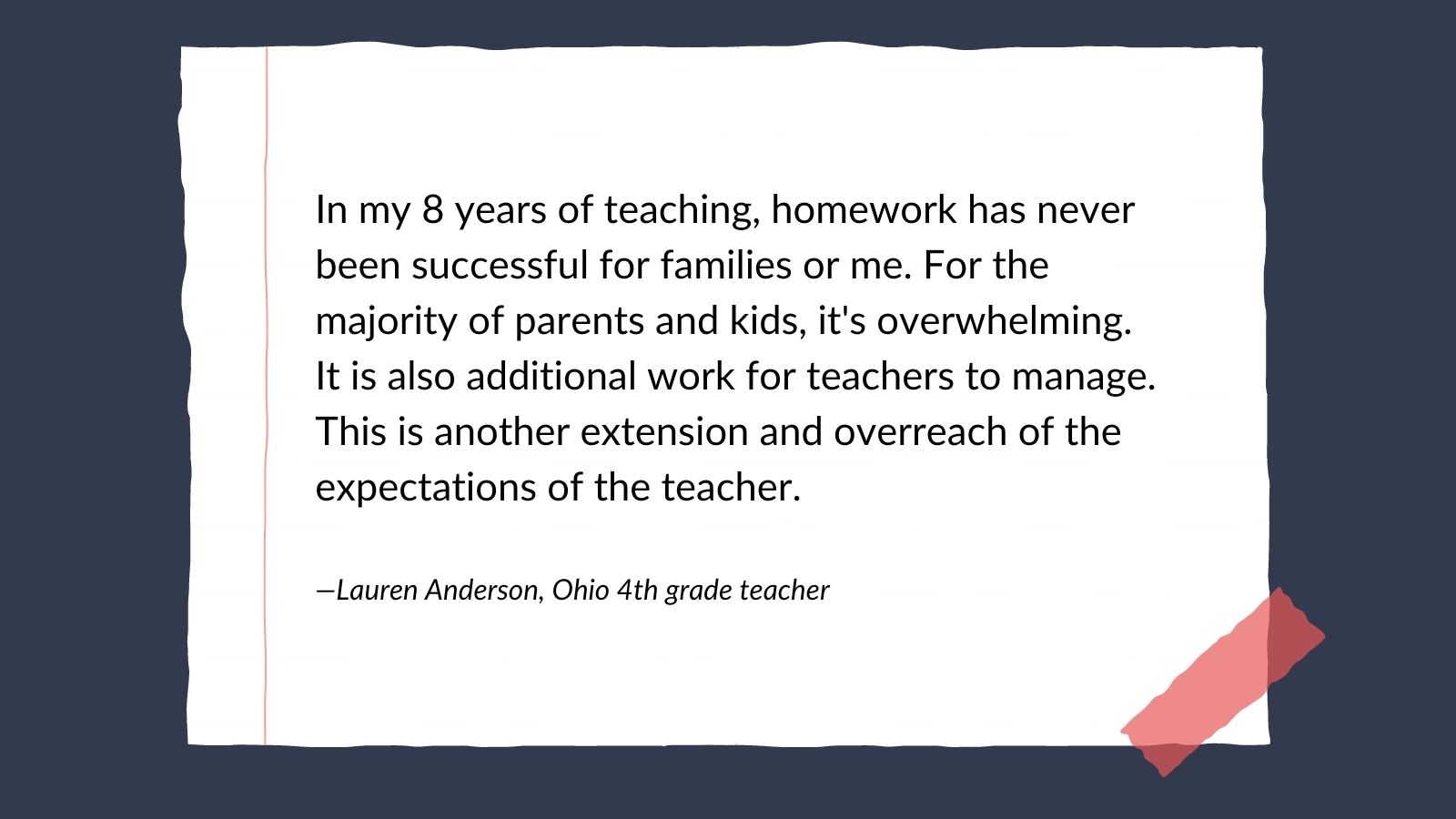
Every kid dreams of it: “Homework banned forevermore!” For as long as anyone can remember, homework has just been one of those things kids have to do because it’s good for them, like eating their vegetables. But is it really as important to do hours of homework every night as it is to eat broccoli and carrots? New research suggests homework might not have a whole lot of value. This leads to a big question: Should we ban homework?
“I think parents already have enough stress just in providing for their families!” says one Arizona 1st grade teacher. “I can imagine one more chore of having to sit down and do homework with their child would add that much more stress. Kids don’t like doing homework, so it frustrates them, which in turn frustrates parents. They spend time fighting about homework that they could be spending quality time over a board game or family meal!”
We wanted to know more, as every educator should. So, we combed through recent research to see what experts say, and explored the news to see what schools in the United States and abroad have tried. Plus, we asked 40+ active K-12 educators to share their thoughts. Here’s what we found out.
Does homework actually work?
This is one of the biggest questions people have around homework bans. Is it worth the time students are spending on it? How many kids actually do it consistently? How involved do parents need to be? In short: Does homework have value?
What the Research Says
Educators first started asking serious questions about homework more than 20 years ago, when an article that evaluated decades of research on homework suggested that it might not be as effective as we thought, at least in the lower grades . But other studies on homework indicate that students who do homework as assigned have higher academic outcomes overall, especially in grades 7 through 12.
What Real Educators Say
Most of the teachers that responded to our survey felt homework (especially for upper grades) does have at least some value. Many, though, were less concerned with academic benefits and more with developing general life skills like time management and responsibility.
- “For older students, reasonable homework that is preparation for class the next day helps students learn how to manage their time, meet deadlines, and take responsibility for their learning. I am a fan of flipped learning—students watch the lesson for homework and then use class time to ask questions, work together, work with their teacher, and do the work.” —Julie Mason, MS/HS English teacher
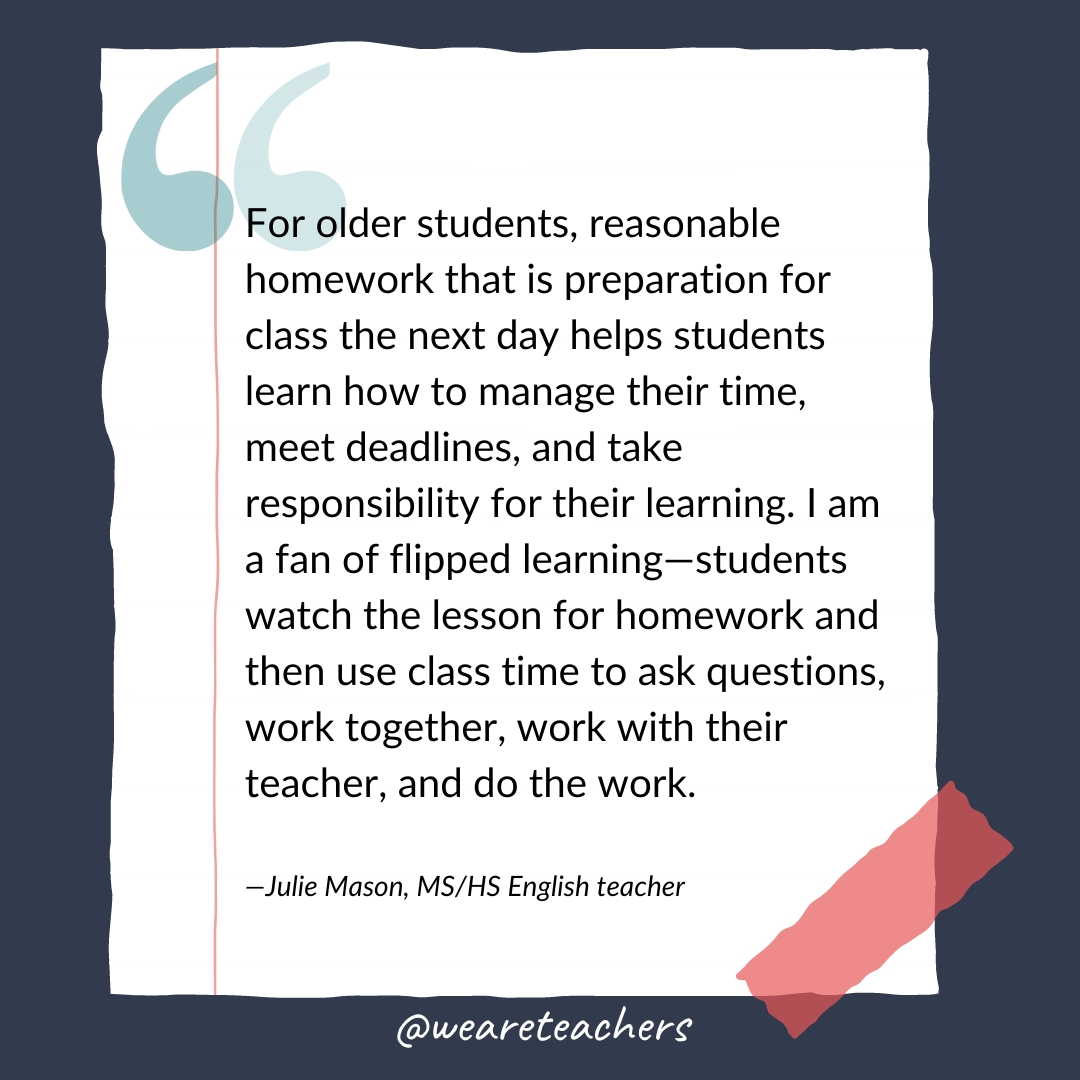
- “In middle school and high school, homework is important because it helps build stamina and potential study habits for college or trade schools.” —Desiree T., elementary teacher
- “Homework is good practice for subjects like math. In other subjects, it is good for reviewing subject matter.” —Ohio 8th grade social studies teacher
- “The proper amount of homework that is relevant to the daily lessons will help reinforce the skill and allow parents to see what their child is learning.” —Joanie B., Texas 4th/6th grade teacher
- “It’s not beneficial; parents today have not been taught how to help with new strategies. They are also often so busy that they cannot be bothered to help so they just give the answers. I saw a lot of this during the pandemic and even after when I would have 1st graders tell me they knew the answer ‘because they just know it.’ Not to mention the students who would actually benefit from having the extra practice of homework oftentimes do not have the support at home.” —Georgia 3rd grade teacher
- “In my 8 years of teaching, homework has never been successful for families or me. For the majority of parents and kids, it’s overwhelming. It is also additional work for teachers to manage. This is another extension and overreach of the expectations of the teacher.” —Lauren Anderson, Ohio 4th grade teacher
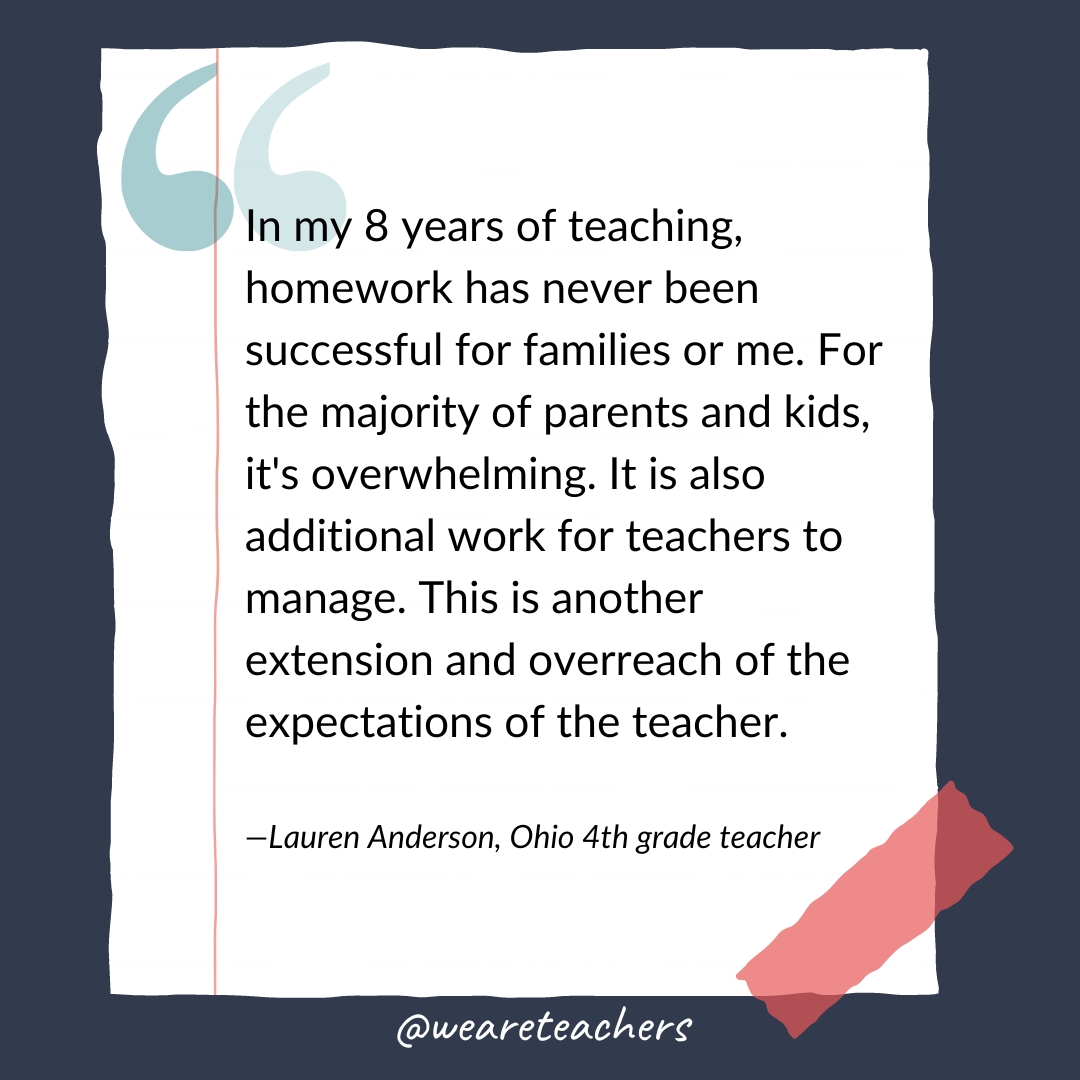
- “Homework isn’t busy work. How will today’s youth become tomorrow’s leaders (or survive college/trades classes) if they aren’t practicing skills to the next level?” —Arizona 1st grade teacher
Should we ban homework in elementary school?
Most adults today didn’t have homework in kindergarten, so they’re surprised when their child arrives home with a backpack full of worksheets. Older elementary students frequently bring home big projects like making a diorama or creating a family tree, something that usually means a lot of parent involvement. Is homework at this age reasonable and meaningful?
Supporters of a homework ban often cite research from John Hattie, who concluded that elementary school homework has no effect on academic progress. In a podcast he said, “Homework in primary school has an effect of around zero … It’s one of those lower hanging fruits that we should be looking in our primary schools to say, ‘Is it really making a difference?’”
The general wisdom these days seems to point to less homework overall at the elementary level, with one huge exception: reading. The research agrees: kids need to read at home as well as at school. Most educators recommend kids spend at least 20 minutes reading at home every single day.
More than half of our survey respondents (56%) are in favor of banning homework for the elementary grades. They worried about kids not having support or resources at home and taking away their time for creative play or family activities. But some teachers still find value in elementary homework, especially for math and reading, as long as it’s minimal. ADVERTISEMENT
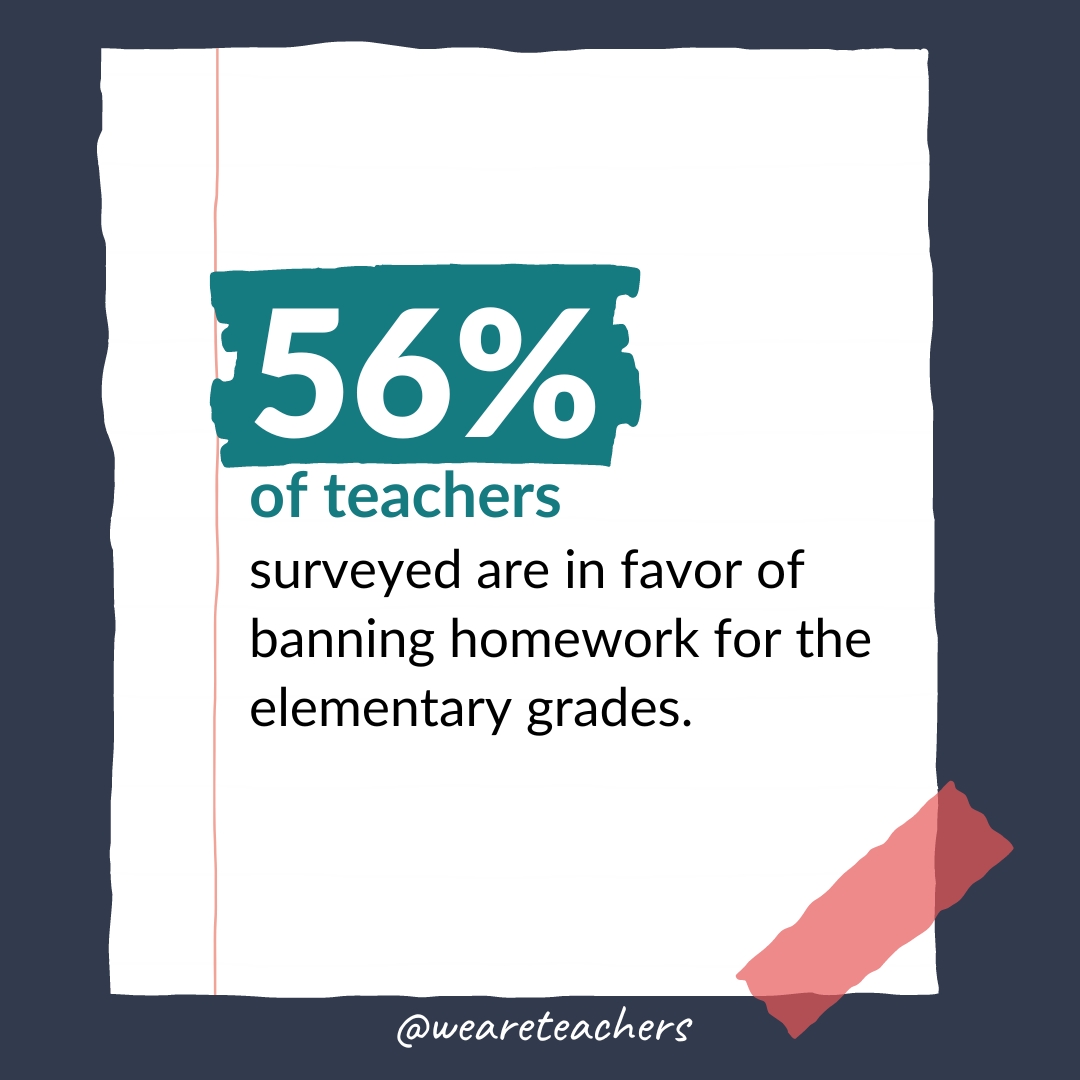
- “The common push for homework in elementary schools is ‘to prepare them for high school.’ That’s overreach. The elementary child’s job is to be an elementary child. We need to teach children where they are.” —Lauren Anderson
- “In elementary school, there should be a mixture of homework and unhomework activities. For example, a homework menu with a list of activities to complete for the month or for the week: Read in pajamas for 20 minutes, complete 3 math sheets, help cook dinner, have a family movie night, write your first and last name 10 times, help pack your snack, etc.” —Desiree T.
- “No homework should be part of the teacher motto—work smarter, not harder. Teachers spend too much time grading homework. I believe teachers and students should commit to making every minute count in the classroom so everyone can go home and just be with family.” —Jennifer N., 5th grade teacher
- “Students are learning new concepts. There is not a guarantee that someone will be able to help them with these tasks. Practicing incorrectly is worse than no practice at all.” —High school resource specialist
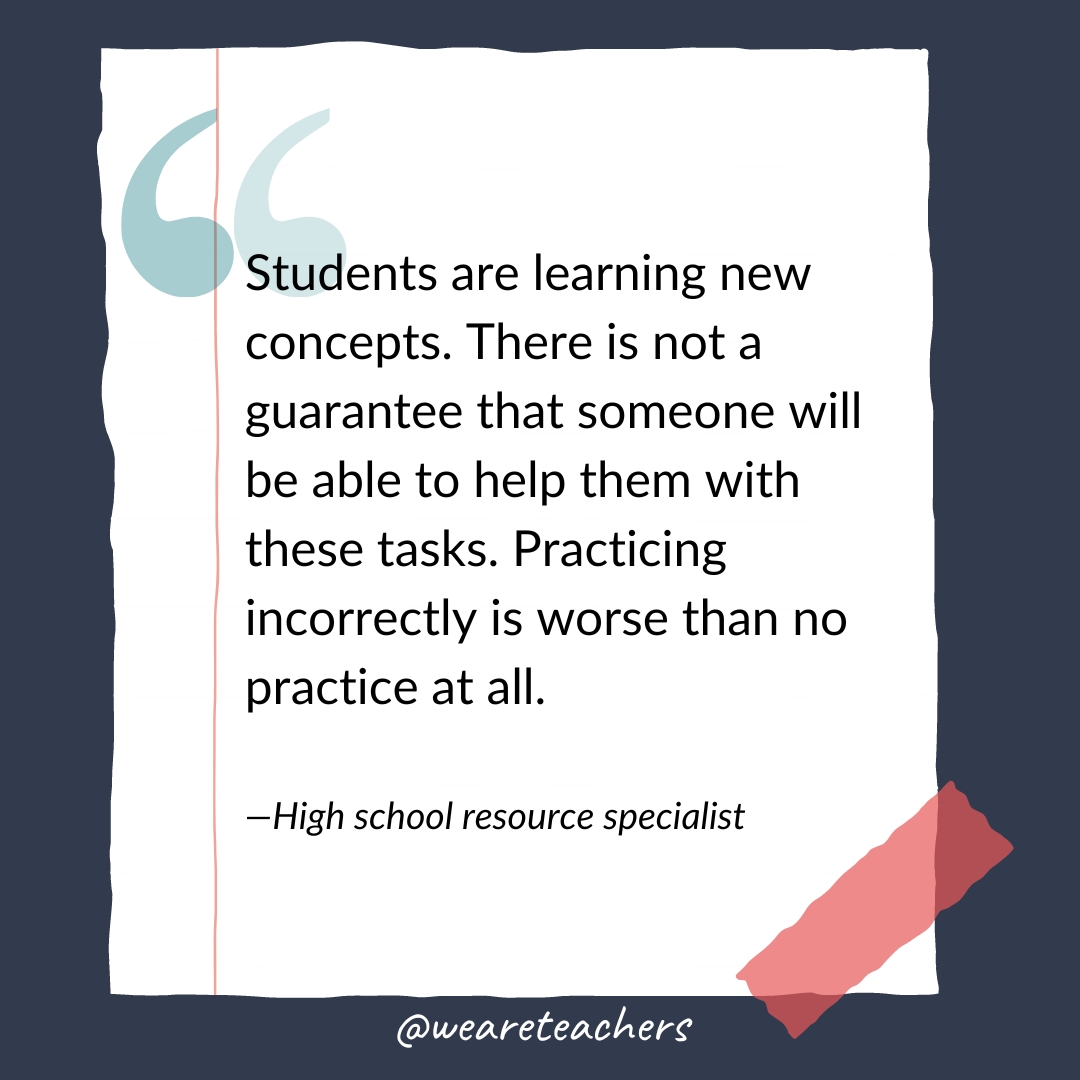
- “Kids should be encouraged to read [at home] and spend time with families and friends.” —Elementary English language development teacher
How much homework is enough (or too much)?
If we agree that that answer to “should we ban homework altogether” is “no,” then how much homework is reasonable? The answer seems to vary by grade level, as you would expect. But many point out the need to focus on the quality of homework over the quantity. And there have been increasing calls to let kids enjoy their longer school breaks without homework hanging over their heads .
A 2019 study showed that teenagers have doubled the amount of time they spend on homework since the 1990s. This study found that teens spend about an hour a day doing homework on average, which many would argue isn’t unreasonable. But in another study , kids self-reported doing an average of three hours of homework a night, which seems a lot more significant.
The National PTA and the NEA recommend kids do about 10 minutes of homework per night per grade level. In other words, a 3rd grader should do 30 minutes of homework. A 12th grader would do 120 minutes, or two full hours.
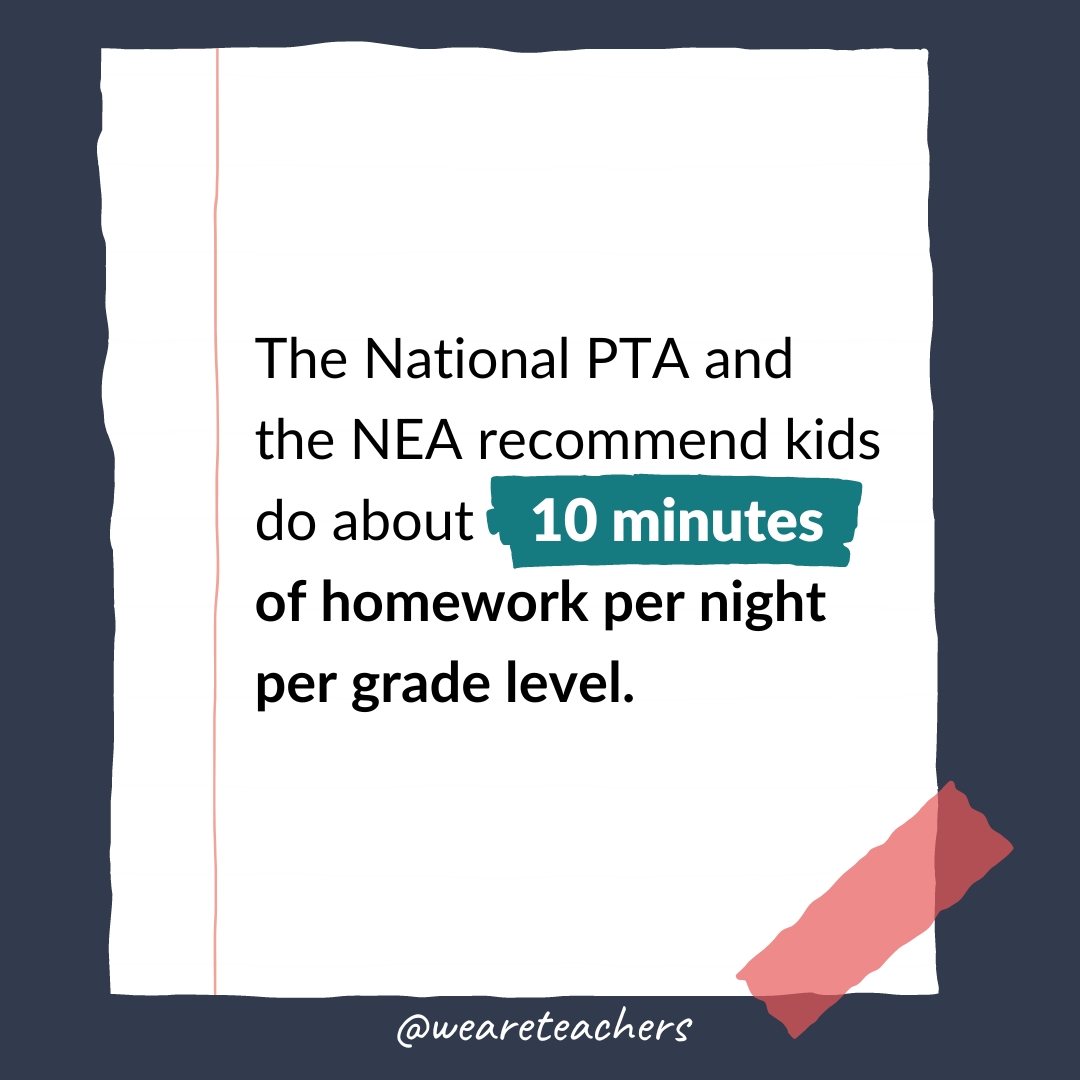
Perhaps more important than “How much homework?” is “What kind of homework?” Meaningful practice of what kids learned in class that day can be helpful. Busywork is not. And assigning really difficult work for kids to tackle at home, without any help from a teacher or other expert voice, is likely to simply frustrate them. Unfortunately, most teachers don’t receive training on how to assign homework that is meaningful and relevant to students. This is another area where we really need to consider a major culture shift.
While 75% of those surveyed say homework has some value in the upper grades at least, most feel it shouldn’t be excessive. Teachers stressed that it should never be used as punishment. Plus, it’s important to remember not all kids have the same access to help and resources outside the classroom.
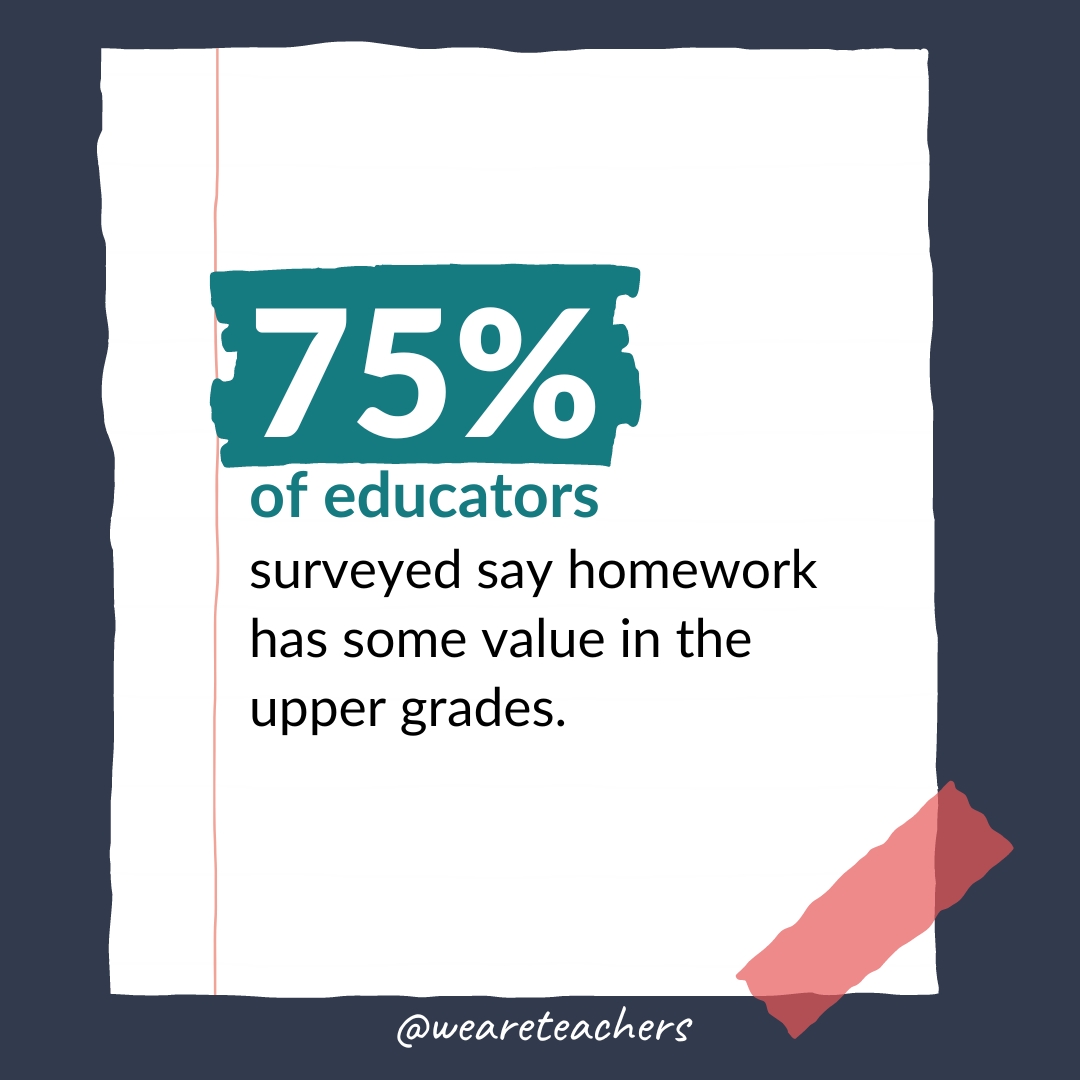
- “Homework is important but I also believe it shouldn’t exceed 30-60 minutes a night.” —Desiree T.
- “I do think elementary students should practice their reading and maybe 10 minutes of math [at home]. That may look different for each child due to how long it may take them to complete something.” —Wisconsin elementary special education teacher

- “Elementary students are not too young to have homework once or twice a week. More than that would be too much.” —Tanya T., HS ELA teacher
- “In order to prepare students for high school, I feel 20-30 minutes of homework is okay [in elementary school].” —Florida 5th grade teacher
- “A ton of homework in every subject is ridiculous. But having to read parts of a book or an article and do several math problems should not be burdensome. And the benefit of those two things has been documented.” —Teresa Rennie, Pennsylvania 8th grade teacher

- “I encourage my elementary students to read a little every day to develop a love of reading.” —Meenal Parikh, Ohio 1st grade teacher
- “I think some homework is reasonable. Should it be a hindrance to other other activities or a major inconvenience? No. Some is good, but it doesn’t need to be an every-night thing.” —Patrick Danz, Michigan high school ELA teacher
Are there benefits to less (or no) homework?
Some schools have already banned homework, both in the United States and around the world. In April 2024, Poland enacted a homework ban for students in grades 1 through 3. In grades 4 through 8, homework must be optional and can’t count toward a student’s grade. Finnish schools are famous for assigning less homework at all ages , yet continuing to score highly in international rankings. So what are the benefits of freeing kids from homework?
Prioritizing mental health is at the forefront of the homework ban movement. Leaders say they want to give students time to develop other hobbies, relationships, and balance in their lives. When two Utah elementary schools officially banned homework , they found psychologist referrals for anxiety decreased by more than 50%.
In some cases, less or no homework can even have a positive effect on academic outcomes. One high school math teacher dramatically reduced the number of practice problems he asked his students to tackle at home. He also decreased the impact of homework on grades (from 25% to 1%). Now kids had more time to spend on just a few practice problems, and they weren’t stressed about getting them wrong. The result of changes like these? Higher standardized test scores on average.
Some schools have experimented with extending the school day in exchange for eliminating homework. This ensures that kids have more time to do independent work while also ensuring access to expert assistance. After all, not all parents have the time or ability to help with homework. And Internet access isn’t a given in every household. Keeping schoolwork at school means giving all kids equal access to the resources they need.
Teachers worry that kids who spend too much time doing homework are losing out in other areas. They want younger students to have more time to play. Older kids should be able to decompress after spending hours in the classroom. And everyone deserves more opportunities for family time and extracurriculars.
- “The stress and time surrounding homework is unnecessary. Jobs don’t require you take work home so school shouldn’t either. If a kid needs to work more, school could reach out with extra help, but homework is a waste of time. Home is for family time.” —Stephanie G., Maryland 1st grade teacher
- “Homework creates an equity problem. Not all learners have access to the same environment or supports at home as they do in school. The students who have supportive parents and resources (tutors, etc.) will succeed, while others will be penalized.” —Illinois high school teacher
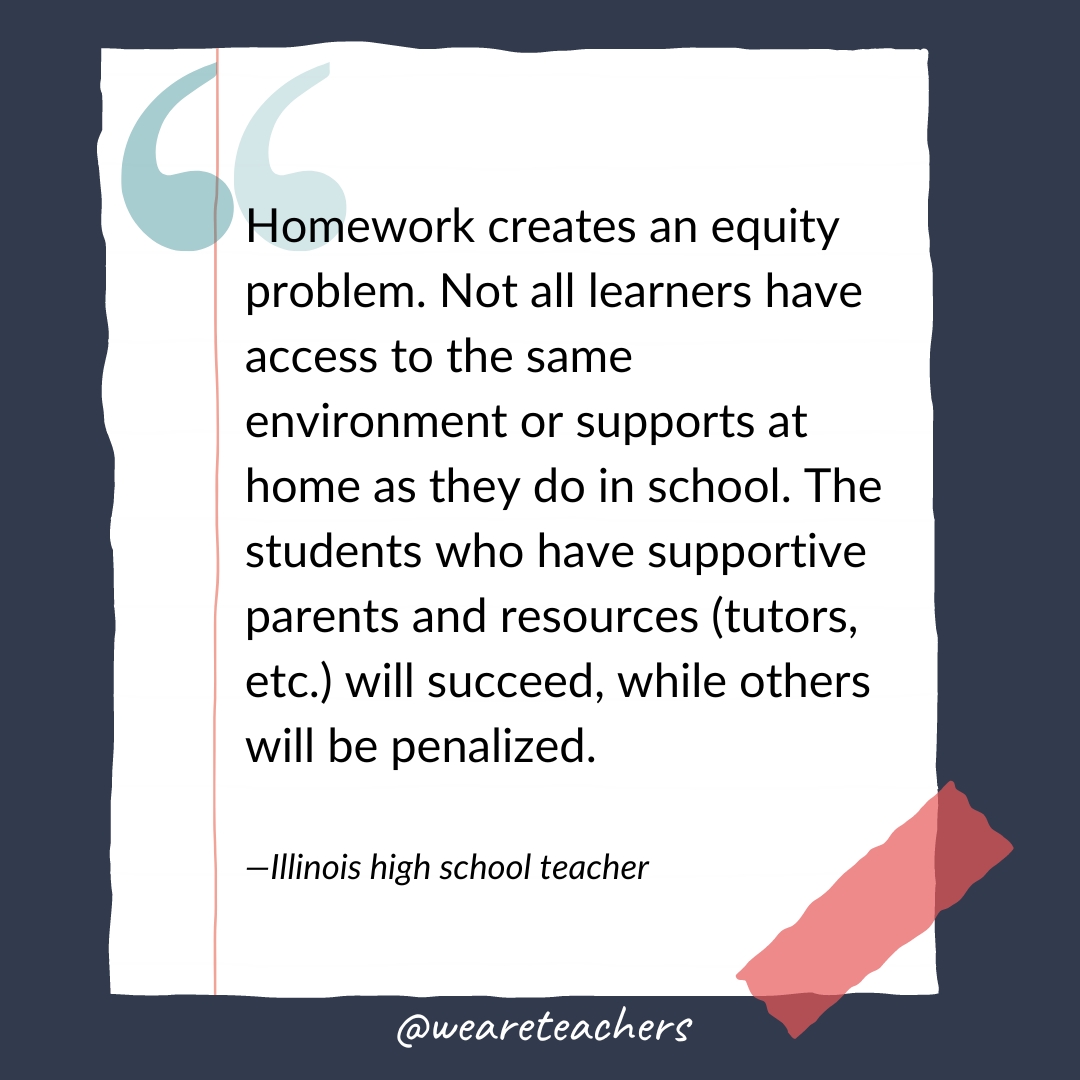
- “If they work at school, they don’t need to work at home. We’re teaching them that it’s okay for someone to tell them how to spend their off-time. School is their job. I don’t like working for free; why should they think that it’s okay?” —North Carolina 1st grade teacher
- “After-school programs, sports, and unstructured play is MUCH more meaningful and impactful for these generations of students.” —Lauren Anderson
- “There are other ways to teach children responsibility and time management than completing homework that will most likely be ungraded.” —4th grade social studies teacher
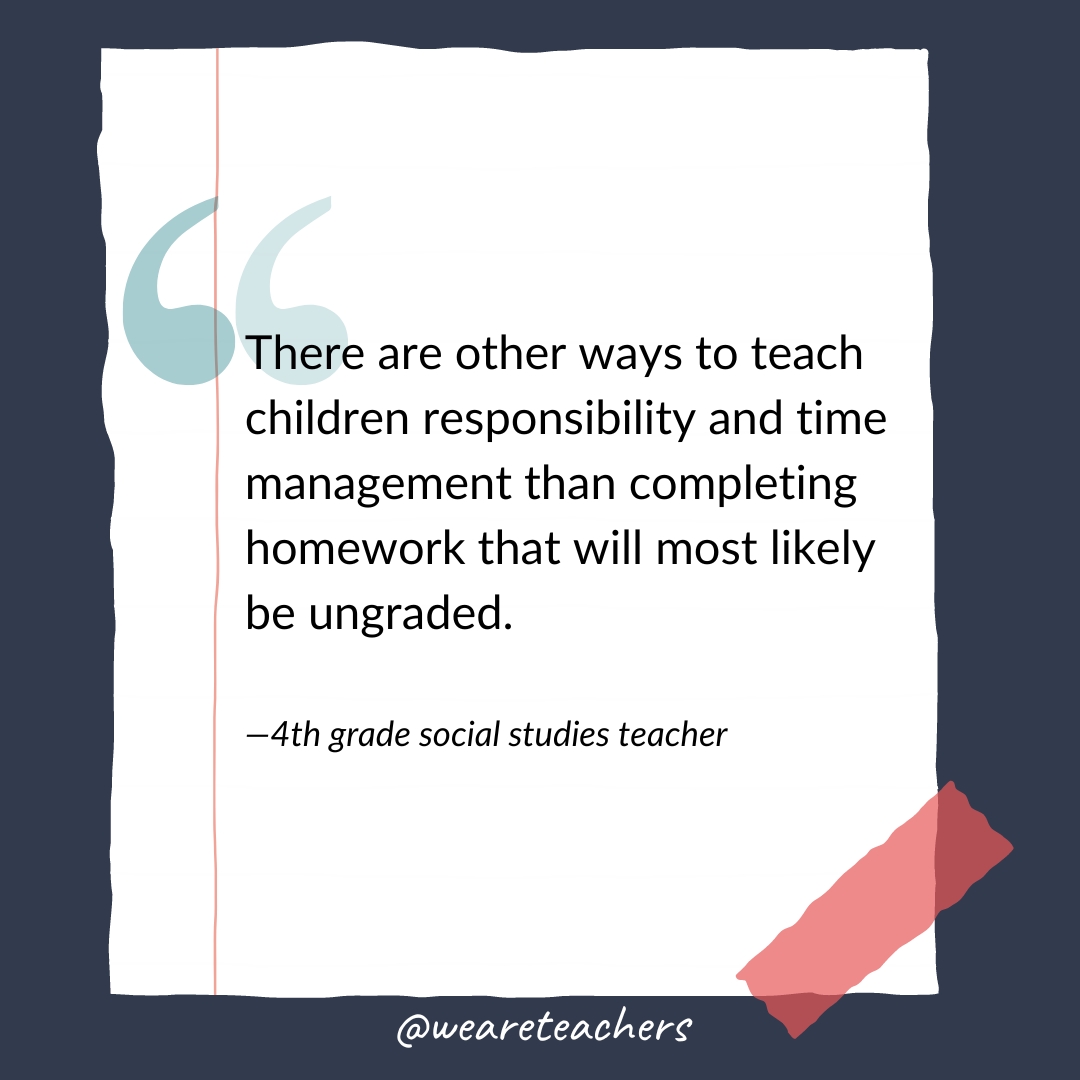
One Teacher’s Take on the Value of Homework: More Cons Than Pros
One 4th grade social studies teacher from North Carolina shared their thoughts with us in detail. We felt they were worth sharing with a wider audience. (Note: We’ve edited and condensed their words for space and clarity.)
Homework Hurts Families
“There are multiple factors that work together that make homework detrimental to students and their families. Children need to spend time with their parents building relationships of trust and respect. It is difficult because during the limited time families have together, they are forced by the schools to give that up to deal with homework.
“Many parents are unable to answer homework questions to help their children as methodology has changed and evolved. Homework becomes a stressful battlefield. Children with ADHD, autism, and other challenges have such a difficult time keeping focus at school. When they have to do additional work at home, there are increased meltdowns and battles, putting further strains on families.”
Homework’s Time Cost
“Children also have less time to complete work at home due to how overscheduled families have become. Children as young as 3rd grade arrive home from their games as late as 10:00 at night. That is often their first opportunity to sit down to complete their work. When they come to school the next day, they become irritable, unfocused, frustrated, and unable to quickly grasp new material.
“In older grades, teachers don’t plan together and don’t understand how much is required of the student to complete each night. If a high school student has six classes and each teacher assigns only 30 minutes of homework each night, that adds up to three hours. I hear of many teachers that each give an hour each night. I don’t see how it is possible for a high school student to complete six hours of homework every night.
“The additional stress of homework for the teacher, students, and families is not worth it. Give families time to spend together, and free up teacher time by not having to hunt down missing work and reviewing what they are not grading. Allow children to have a better bedtime and avoid meltdowns at home, which lead to additional stress, anxiety, and depression.”
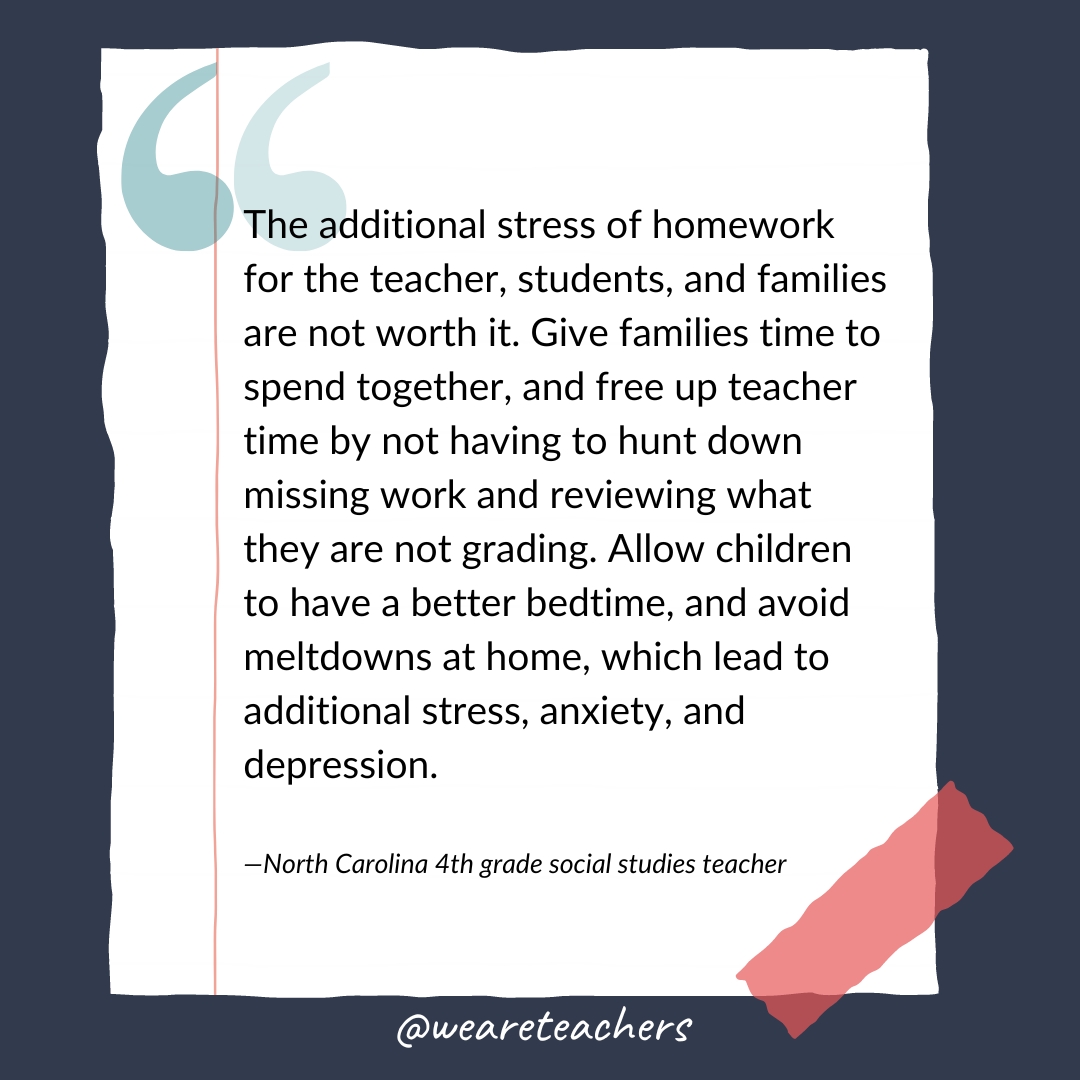
We’d love to hear your thoughts—should homework be banned? Join the discussion in the We Are Teachers HELPLINE group on Facebook.

You Might Also Like

90+ Awesome Websites for Teaching and Learning Math in 2024
Bookmark this list STAT! Continue Reading
Copyright © 2024. All rights reserved. 5335 Gate Parkway, Jacksonville, FL 32256

IMAGES
VIDEO
COMMENTS
Teachers should reconsider giving homework for several compelling reasons: Mental Health Impact: Homework can contribute to stress, anxiety, and even depression in students. Excessive workload and pressure to complete assignments within tight deadlines can take a toll on students’ mental well-being.
Cooper suggests that teachers at the younger level may assign homework for improving study skills, rather than learning, explaining why many studies concluded less benefit for younger children. Many teachers do not receive specific training on homework.
We assume that it fosters a love of learning, better study habits, improved attitudes toward school, and greater self-discipline; we believe that better teachers assign more homework and that one sign of a good school is a good, enforced homework policy.
10 Reasons Why Should Teachers Not Give Homework. 1. Students Need Time to Rest; 2. Homework Can Cause Stress; 3. Not Everyone Has Help at Home; 4. Kids Need Time for Hobbies; 5. Family Time is Important; 6. It Reduces Playtime; 7. Students Learn Better When They’re Happy; 8. Too Much Homework Can Hurt Health; 9. School Work Should Stay at ...
Many adults will say that homework helps students build character, promote self-discipline, and teaches good work habits, but there is no evidence to this. Homework is frustrating and exhausting, can cause family conflict, takes away students’ time for other activities, and can reduce a student’s interest in learning.
Some educators are pushing to get rid of homework. Would that be a good thing? Do you like doing homework? Do you think it has benefited you educationally? Has homework ever helped you...
Research makes a strong case for doing away with homework. The word homework doesn’t just elicit groans from students. Many veteran educators aren’t fans of it either. Barbara Tollison, a high...
Teachers believe that homework not only gives time management, but also perseverance and responsibility. Teachers in general should decrease the amount of outside-school work, and work more internally within the school, so that students have hands on assistance and can reduce stress.
Children need time for play, social interaction, and pursuing interests beyond academics. Excessive homework can encroach on these essential aspects of childhood. By reducing the homework burden, educators acknowledge the importance of maintaining a balance between academics and personal growth.
“No homework should be part of the teacher motto—work smarter, not harder. Teachers spend too much time grading homework. I believe teachers and students should commit to making every minute count in the classroom so everyone can go home and just be with family.” —Jennifer N., 5th grade teacher